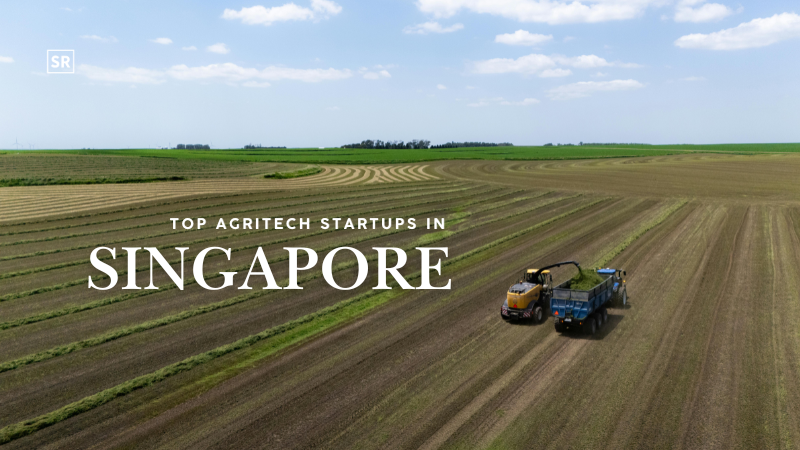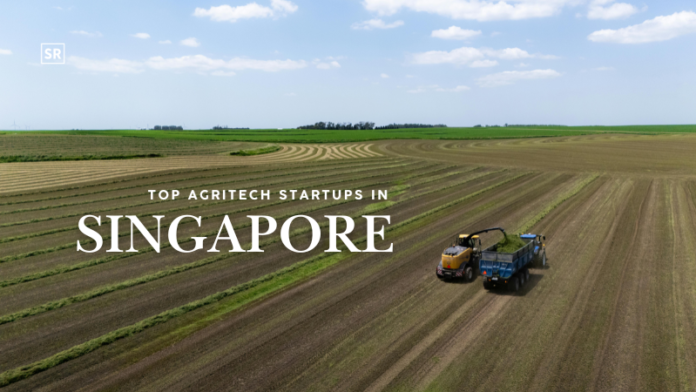
Singapore’s agriculture and agri-tech sector is a small but rapidly growing industry focused on innovation. The country’s agriculture mainly involves urban farming and aquaculture, producing eggs, seafood, and vegetables. With about 150 land-based and 110 sea-based farms, Singapore is investing in agritech to boost productivity within its limited space. This includes solutions like vertical fish farms, indoor hydroponics, and rooftop gardens.
Currently, Singapore imports about 90% of its food, making it vulnerable to global supply fluctuations. With a projected agricultural gross production value of $124.7 million in 2024, there are various opportunities for agritech startups, including competitions, expos, and support from organizations like Enterprise Singapore.
Here is the list of top 10 AgriTech startups in Singapore
Table of Contents
Olam Agro
- Founded Year: 1989
- Location: Singapore
- Stage: Acquired
Olam Agro is a leading food and agri-business that supplies ingredients, feed, and fiber to customers worldwide, from big brands to small family businesses. Their global team has strong positions in cocoa, coffee, cotton, nuts and spices. Olam Agro ranks among the top 30 companies on the SGX-ST and is a Fortune Global 500 company, included in the FTSE4Good Index since June 2020. They offer processing and selling solutions for farmers, providing services from farm to table along with supply chain and risk management solutions.
TreeDots
- Founded Year: 2017
- Location: Singapore
- Stage: Series A
TreeDots is a food ecosystem that optimizes the food supply chain and aims to reduce food waste. The company connects suppliers with businesses to sell excess or imperfect food at lower prices without sacrificing quality. TreeDots also provides logistics services to help deliver temperature-controlled food effectively.
It operates an online marketplace for surplus food, which facilitates B2B trading from various events. Major buyers include corporate pantries, welfare organizations and food and beverage businesses. The company operates throughout Singapore.
UMITRON
- Founded Year: 2016
- Location: Singapore
- Stage: Series A
UMITRON is a deep tech company focused on improving sustainability in aquaculture. UMITRON aims to make aquaculture more sustainable using IoT, satellite remote sensing and AI. Their technology helps farmers increase efficiency, manage environmental risks and boost revenue. UMITRON offers automatic feeder systems that monitor fish behavior and optimize feeding.
Their solutions include solar-powered IoT devices that film fish and track their behavior. Using machine learning, these devices can detect when fish are hungry and release feed automatically. They also use satellite imagery to provide insights into sea temperature and rely on edge computing to manage data transfer efficiently.
Rize
- Founded Year: 2023
- Location: Singapore
- Stage: Series A
Rize is a Singapore-based Agri-Tech startup focused on decarbonizing rice farming in Asia. The founder and CEO of Rize is Dhruv Sawhney. Its goal is to reduce greenhouse gas emissions and improve farmer’s economic stability, as a significant challenge in rice cultivation includes methane emissions from flooded paddies and greenhouse gas emissions from burning rice straw after harvest.
Rize uses technology to collect agricultural data and help farmers adopt sustainable practices through Measuring, Reporting and Verification (MRV) systems. The company recently raised $14 million in Series A funding from investors like Breakthrough Energy Ventures, Temasek and Wavemaker Impact.
Barramundi
- Founded Year: 2008
- Location: Singapore
- Stage: Series B
Barramundi Group is dedicated to providing premium quality fish with sustainability at its core. The company aims to help close the global protein gap by leveraging the potential of barramundi. They operate R&D and broodstock facilities in Singapore and ocean farms in Brunei, using advanced aquaculture technology and best practices to produce responsibly farmed barramundi while protecting ocean resources.
With an end-to-end aquaculture model, they control the entire value chain from farm to fork, through which they supply barramundi to over 1,600 restaurants, hotels and retailers worldwide. In addition to barramundi, the company offers by-products like swim bladders, heads, bones, and scales.
SAT
- Founded Year: 2012
- Location: Singapore
- Stage: Series A
Singapore Aquaculture Technologies is focused on developing a technology-driven approach to sustainable aquaculture. The company ethically farms premium fish using plug-and-play farms, farm management systems and cloud-based data analytics. They operate solar-powered, zero-waste farms in closed loops to aim for true sustainability.
As a pioneer in data and AI-driven aquaculture, their climate-resilient tank-based farms are modular and located near the shore, minimizing competition for land and freshwater. They use renewable energy and near zero-waste techniques to produce seafood sustainably, while AI and data analytics help manage fish growth and feeding.
Peptobiotics
- Founded Year: 2021
- Location: Singapore
- Stage: Series A
Peptobiotics is a Singapore-based agritech startup that develops antimicrobial peptides as a safer alternative to antibiotics for farming and aquaculture. These peptides effectively kill bacteria without causing antibiotic resistance. Company aims to reduce the overuse of antibiotics which can lead to resistant bacteria. Their goal is to create products that are effective for farmers, safe for consumers and humane for animals.
Peptobiotics uses biotechnology to lower the cost of manufacturing these peptides and has developed cost-effective pathogen management solutions. In April 2024, they raised $6.2 million in a Series A funding round led by Hatch Blue, with investments from Seeds Capital, Seventure Partners, GrainCorp Ventures and Farmabase.
Pure Salmon
- Founded Year: 2018
- Location: Singapore
- Stage: Series A
Pure Salmon is a global land-based salmon aquaculture company focused on providing clean, healthy and sustainable protein while making a positive environmental and social impact. The company uses proven Recirculating Aquaculture System (RAS) technology to produce fresher and fully traceable salmon locally. Owned by the Singaporean private equity fund 8F Asset Management, Pure Salmon aims to be the largest sustainable producer of Atlantic salmon in the world.
The company operates projects in Japan, the USA, France, Brunei and Saudi Arabia. Pure Salmon is a founding signatory of the Sustainable Blue Economy Finance
INSEACT
- Founded Year: 2019
- Location: Singapore
- Stage: Seed
INSEACT is a producer and distributor of insect-based fish feeds using Black Soldier Flies (BSF) that consumes bio-waste like Palm Kernel Meal. They create proteins for fish feed, lipids for oil and fertilizers through a controlled fermentation process. Most farmed seafood relies on wild-caught fish for feed, but INSEACT replaces fish protein with insect protein.
They grow BSF larvae using waste from the palm oil industry that would otherwise go to landfill. This innovative protein is more profitable for shrimp aquaculture than traditional feeds. INSEACT focuses on environmental, social and governance (ESG) impacts in Asia, diverting agricultural waste back into the foodstream to support a circular economy.
Vertical Oceans
- Founded Year: 2020
- Location: Singapore
- Stage: Seed
Vertical Oceans is a producer of sustainable seafood in Singapore using IoT and AI-enabled vertical systems. Their vertical farms combine multi-trophic biology with advanced digital technologies in modular habitats stacked in towers. Data from sensors flows into AI algorithms to optimize growth, water quality, and energy usage.
Their technology includes an AI-native autonomous system and proprietary software to ensure the best conditions for shrimp growth while minimizing waste. Vertical Oceans creates a balanced ecosystem for shrimp, fish, and algae using algorithms, tanks, and artificial lighting.
The company has a pilot plant at the Marine Aquaculture Centre on St. John’s Island and is developing a commercial facility capable of producing 1,000 tons of seafood per year. Vertical Oceans sells shrimp locally and delivers directly to customers. They plan to build and operate their systems while offering ready-made systems through a franchise model.
Conclusion
Singapore’s farming sector is tiny, using less than 1% of its land, and focuses on eggs, seafood, and veggies. The country wants to grow more food at home and rely less on imports. Its goal is to produce 30% of its food by 2030. To do this, the government is spending on new ideas like vertical farms, lab-grown meat, and a unique agri-food park. They’re also trying city farming, fish farming, and unusual foods like insects and microalgae. Plus, they’re improving food processing and encouraging community gardens. The “30 by 30” plan gives money to support these new methods.
FAQs
What is the Agritech sector in Singapore?
Agricultural technology, or agri tech, is transforming how Singapore handles food production and security by offering innovative solutions to boost productivity, improve resource use, and ensure sustainable food supply.
What is the growth rate of the Agritech industry in Singapore?
The agritech industry in Singapore is growing quickly, with an 18% growth rate as of August 2022. The vertical farming market is expected to grow at a rate of 20.4% annually from 2024 to 2030.
How many Agritech startups are there in Singapore?
Singapore has 225 AgriTech startups, including companies like TreeDots, Rize, UMITRON, Barramundi, and Peptobiotics.





